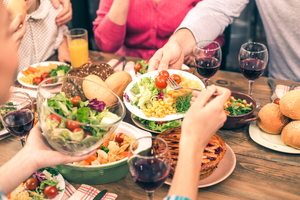In this article:
- More than half of Americans drink, and many drink excessively.
- Alcohol consumption can lead to weight gain, accidents, and increased risk of chronic health conditions like heart disease, certain cancers, and liver problems.
- A Dry January involves eliminating alcohol for a month. When they reduce or avoid alcohol, regular drinkers, people quickly notice benefits like better sleep, energy, and ability to focus. It can also be easier to achieve weight goals.
- If you want to avoid alcohol, plan ahead. Order or make non-alcoholic beverages, and replace events at a bar with events elsewhere.
- Look for support from family, friends, and trustworthy support groups.
- Lark can support your goals and help you stay motivated as you make progress towards your health and weight loss goals with or without GLP-1s as you log food, get tips for eating healthier, and make small changes that can turn into healthy habits.
Happy New Year!
If you’re thinking about your goals for this year and how to achieve them, consider alcohol consumption. If you regularly consume alcohol, you might want to think about going dry this January. It can give you a chance to see what life’s like without alcohol, and you may be pleasantly surprised at the physical, emotional, and social changes that can occur.
Dry January is a trademarked concept from Alcohol Change in the UK. Giving up alcohol for a month, or cutting back, can be challenging, but there are lots of strategies for coping. Here’s what to know about the effects of regular alcohol consumption, the possible benefits of reducing consumption, and what you can consume instead of alcohol.
Background on Alcohol and Its Effects
Alcohol has calories, but it’s not an essential nutrient. The risks of drinking alcohol are likely to outweigh the possible benefits. Mayo Clinic lists these long-term effects of drinking.
- Higher risk for cancer including breast cancer
- Heart disease
- Stroke and high blood pressure
- Unwanted weight gain
- Liver inflammation and damage
- Higher risk for anxious mood and depression
Short-term risks include vehicle and other accidents, as well as dangerously low blood sugar in people with diabetes.
Risks are greater when people engage in excessive drinking, defined as one drink a day for women and two for men. Still, the Dietary Guidelines for Americans suggest limiting or avoiding alcohol, stating that, “drinking less is better for health than drinking more.“
If you drink, you’re among the half of Americans who do. The Centers for Disease Control and Prevention (CDC) also provides these stats.
- Many drink excessively.
- 17% of Americans engage in binge drinking, which means they have at least four (women) or five (men) drinks on one occasion.
- 6% of Americans engage in heavy drinking, or at least 8 drinks per week for women and 15 for men.
Benefits of a Dry January
You can make many possible resolutions for the new year, so why might reducing or eliminating alcohol be a priority?
1. Long-term benefits
Risks for long-term negative effects decrease within three months of quitting alcohol, according to Mayo Clinic. It’s possible to see improvements in blood sugar, blood pressure, and blood lipid levels.
2. Immediate benefits
You may feel better quickly. For example, you may have more energy, better sleep, and a more positive mood. You may think more clearly and be more productive at work and home, getting more done in less time. It could be easier for you to be physically active, which in turn boosts mood and productivity.
3. Social and personal benefits
If a lot of your relationships revolve around regular alcohol consumption, quitting alcohol for a while may help you rethink those relationships. It may give you a chance to get to know your current friends in a different way, or to find new friends with whom you have more in common
than drinking. You may save some money since alcoholic beverages can be pricey. Without going to bars to drink, or spending time nursing a hangover, you might also find more time in your schedule for other activities.
4. Weight control benefits
If you drink regularly, cutting back on alcohol or eliminating it can have a significant impact on your weight since alcoholic beverages have calories.
Here are some approximate calorie counts in various alcoholic beverages, according to Medline Plus.
- 12-ounce beer: 150 calories
- 5-ounce wine: 130 calories
- 1.5-ounce shot of liquor: 100-150 calories
- 4-7-ounce mixed drink: 100-200 or more calories
Snacks and other food that you eat at the bar, at restaurants, and at home while drinking also contribute to your calorie intake. Bar snacks like nuts, peanuts, chips, sliders, and fried foods; restaurant meals; and late-night comfort foods like tacos, burgers, and burritos can contribute hundreds or even thousands of calories.
Reducing or eliminating alcohol consumption and high-calorie foods that go with it can help with weight loss.
Planning for a Dry January
The CDC has a screener that can help assess your alcohol use.
Here are some ideas to support your efforts, including tips from the Harvard School of Public Health.
- Order or make non-alcoholic beverages. Try sparkling water, mocktails, and spritzers. Ask the bartender for non-alcoholic options. If you’re at home, make mocktails instead of cocktails.
- Plan what you’re going to eat ahead of time. This can help you choose lower-calorie, higher-nutrient foods, and keep portions in check. Salads, raw vegetables with healthy dips, olives, and cocktail shrimp are options with fiber or protein. To make portion control easier, use smaller plates.
- Replace occasions that center around drinking with other events. For example, instead of game night at a bar, take turns hosting game night at your friends’ homes.
- Ask for family members or friends to support you. It can be helpful, for example, if they agree not to order alcoholic beverages when you go out to eat with them, or if they are willing to explore other options for fun besides going to a bar. You can also look for support groups sponsored by organizations that you trust.
- Limit your exposure to alcohol to help keep yourself from drinking. Keep alcohol out of your home to reduce the likelihood of drinking at home. If you go to an event with an open bar, stay away from the bar table.
- Expect to have setbacks. Instead of giving up if you happen to have an alcoholic drink, just try again to go back to a non-alcoholic lifestyle. The most important thing is to keep trying.
- Track days when you did or did not drink alcohol so you can see your progress and patterns. You might also want to note how you felt,
How Lark Can Help
Reducing alcohol consumption for a month can have a major impact on how you feel. Lark can help you make progress towards your weight and health goals by making small changes. Your Lark coach is available 24/7 for encouragement, nutrition and physical activity coaching, and habit tracking. Lark can help you make healthy choices and establish habits that fit into your lifestyle so you can lose weight and keep it off with or without GLP-1 medications.
Click here to see if you may be eligible to join Lark today!











.webp)






